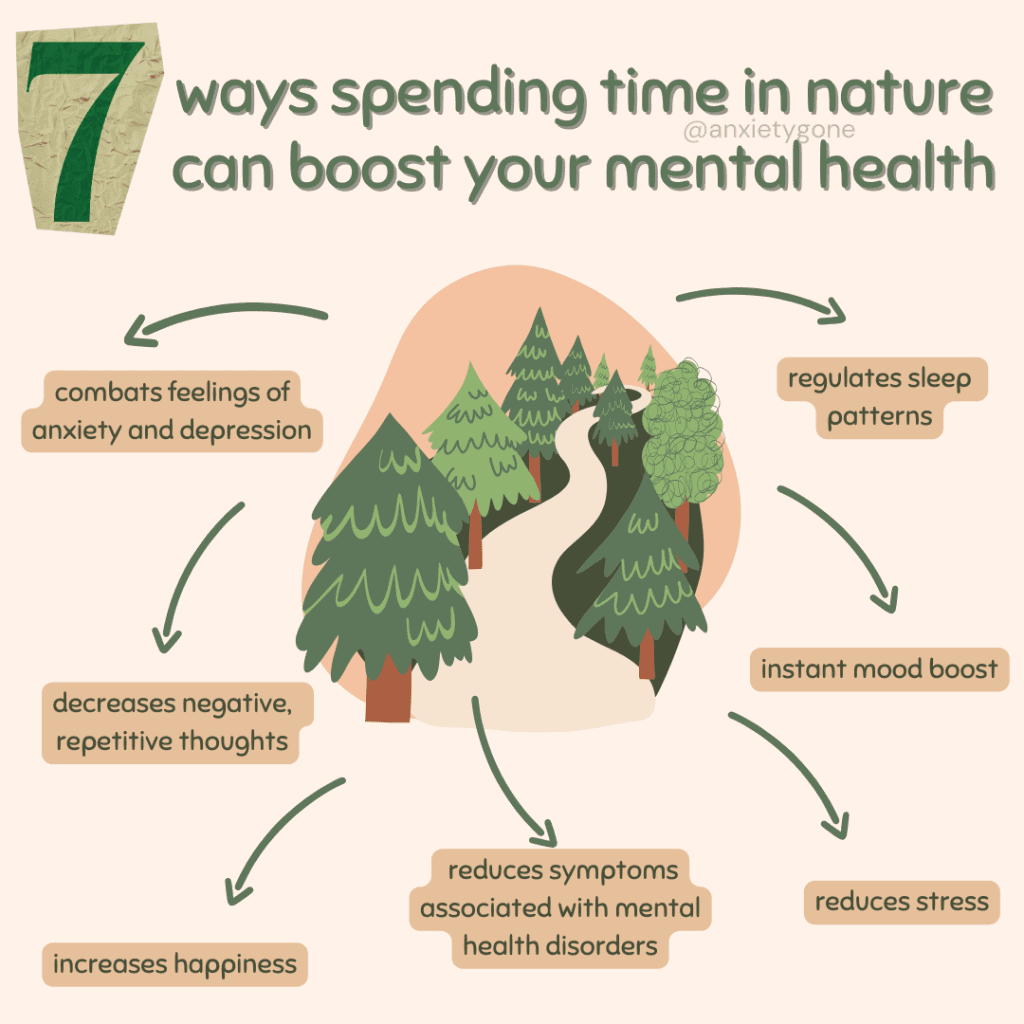5. Nature Naturally Lifts Your Mood
How nature helps mental health is not a coincidence – it’s chemistry. Spending time in nature has a powerful effect on mood, helping to shake off that low-energy, foggy feeling and bring in a sense of calm, lightness, and joy. And it’s backed by science. Natural environments help stimulate endorphin release (those feel-good chemicals your brain loves), which naturally boosts your emotional state.
Even the small things, like the soft colours of wildflowers, the sound of birds, or the smell of pine after the rain shifts your focus away from internal chaos.
Bonus Tip: Pay attention and focus on these little details throughout the day, every day, as often as you can. Say outloud or in your head, “Thank you, more please”. It’s a simple practice that combines a bit of gratitude and manifestation into one.
6. Nature Sharpens Your Mind
If your brain ever feels scattered or foggy (hi, modern life), nature can help bring it back into focus. Research shows that time spent in nature can improve cognitive function, especially memory, attention, and creativity.
Another one of the lesser-known ways nature helps mental health is by resetting your brain’s attention span. Nature gently engages your senses without overwhelming them, which gives your brain the downtime it needs to recharge. As your mind clears, thoughts begin to flow more easily, decisions feel less daunting, and problem-solving becomes more intuitive.
7. Nature Supports Better Sleep (and That Supports Everything Else)
We all know that feeling after a good night’s sleep. You feel calmer, clearer, and just better in general. That’s because sleep is one of the most essential resets for our mental health. But if you struggle with racing thoughts at night (don’t we all?) or sleep anxiety, getting into REM can feel impossible.
One of the gentlest (and most overlooked) tools? Nature.
Spending time outdoors, especially in the morning, helps realign your body’s internal clock. Natural light tells your brain when it’s time to wake up and, later in the day, when it’s time to start winding down. As the sun sets and light fades, your body naturally boosts melatonin, making it easier to fall asleep and stay asleep.
Bonus Tip: Wake-Up clocks mimic the natural light in the morning to give you all of these effects right from your alarm clock
8. Helps Soothe Symptoms of Mental Health Disorders
Nature isn’t a cure-all but it is a powerful companion when you’re navigating mental health challenges like PTSD, ADHD, depression, or anxiety. Time spent outdoors has been shown to reduce stress hormones, ease panic, and lift mood—without pressure or expectation. It creates a quiet space where your nervous system can breathe.
9. Sparks Creativity and Self-Expression
Sometimes your mind just needs something beautiful and unexpected to spark joy and nature is full of tiny creative invitations. The shimmer of leaves in the sunlight, the shapes of clouds, or the sound of a creek can inspire fresh thoughts, new ideas, and creative breakthroughs.
Whether you’re writing, painting, or just daydreaming, this is one of the more joyful ways nature helps mental health: it reawakens your imagination. And as we all [should] know by now if you’re a regular visitor, creativity offers a healthy outlet for emotions, encourages a sense of accomplishment, and gives your mind a break from stress.
So grab a journal, sketchpad, or your favourite music and let nature be your muse. You never know what might bloom from just stepping outside.
Start Your Self-Care Journey Today
You deserve a moment that’s just for you. The
Silk + Sonder Journal
is a beautifully crafted, guided self-care tool designed to help you feel more grounded, more inspired, and more in control of your mental wellness.
With calming layouts, therapeutic prompts, and mindfulness exercises, you’ll build habits that nourish your mind, body, and soul — one page at a time.
Start Your Journey Here
10. Nature Strengthens Your Immune System (Which Boosts Your Mood Too)
It might not seem obvious at first, but your immune system and mental health are deeply connected. When your body is run down, your mind usually feels it too. But here’s where nature steps in again, spending time outdoors has been shown to help strengthen your immune system, which in turn supports a more balanced mental state.
How nature helps mental health here is by reducing stress, which is a known immune system suppressor. Less stress means fewer sick days and more energy to enjoy the things that make you feel good. It’s a ripple effect—better immunity leads to less anxiety about your health, which creates space for a calmer, more grounded mindset. So yes, that walk through the woods is doing more for you than you think (and pairing it with a little grounding tool like a fidget ring makes it even better).
11. It Naturally Boosts Your Energy
Nature has a way of recharging your internal batteries, especially when you’ve been feeling mentally or emotionally drained. The sights, smells, and sounds of the outdoors can help shake off that sluggish feeling and fill you with a renewed sense of motivation.
With more energy, we’re more likely to move our bodies, try new things, and re-engage with life, which all play a major role in improving mental health. Plus, the boost in endorphins from even light movement in a natural setting acts like a gentle mood lift. It’s one more way how nature helps mental health feel more manageable, even when everything else feels a little heavy. You’ll return to your day with a little more spark, and maybe even the motivation to finally use those self-care items you’ve been meaning to try.
12. It Lowers Negative Emotions and Calms Inner Tension
Research has shown that natural environments help reduce aggression, irritability, and negative emotional spirals. And when those emotions are softened, our capacity to manage anxiety, communicate kindly, and show up for ourselves increases.
This is a big one in terms of how nature helps mental health – it doesn’t just lift your mood, it helps you unhook from the patterns that are dragging you down. Less tension also means fewer reactive outbursts, fewer regrets, and more room for positive interactions, with both yourself and the people around you. So the next time frustration builds, try stepping outside, running your fingers over a spinner ring, and just taking a moment. It might not solve everything, but it will soften the edges. And sometimes, that’s enough to turn your whole day around.
13. Nature Builds Resilience
Life is full of curveballs, but spending regular time in nature can help you feel more grounded and better equipped to handle them. Studies show that time outdoors helps build emotional resilience, which means your nervous system becomes better at bouncing back when life feels like a lot. This is one of the most powerful ways how nature helps mental health, as it teaches us to pause, breathe, and keep perspective when the stress starts creeping in.
With more resilience, you are more likely to face challenges with a “how can I handle this?” mindset, rather than feeling stuck or overwhelmed. That small shift in thinking can change everything, especially if you’re prone to spiraling thoughts or chronic stress.
14. It Gently Boosts Self-Esteem and Confidence
You don’t need to scale a mountain to feel accomplished in nature (though, hey, you could). Even small outdoor wins, like tending to your garden, can boost confidence and remind you of your own strength. Nature gives us space to try, move, reflect, and succeed on our own terms.
15. Nature Helps You Be Right Here, Right Now
In a world full of noise, nature invites us to be quiet. It gently calls us back to the present and that’s the magic: being present. Mindfulness is a proven tool for anxiety and stress relief, and nature is one of the most effective ways to access it.
So next time your thoughts start racing, try stepping outside, taking a deep breath, and tracing the edge of your fidget ring. It’s a simple way to come back to the moment and that moment might be exactly what you need.










